- Home
- Jasper Fforde
The Fourth Bear Page 12
The Fourth Bear Read online
Page 12
“From the explosion?” asked Mary.
“Could be. Anything else?”
“This,” replied Mary, holding up a Dictaphone. She rewound the tape a couple of seconds and then pressed “play.” There was a beep and a message from Goldilocks’s garage about her car being ready.
“Her answering machine,” said Mary. “But listen to this.”
The next message was that of a breathless and elderly man, who sounded as though he were hurrying somewhere.
“Hello?” said the voice. “This is Stan Cripps and—Wait a moment.” There were more sounds of shuffling, the creak of a door opening, then a crackle on the tape, a pause, then the voice again, this time in breathless wonder: “Good heavens. It’s…full of holes!” There was then a sudden blast of static and a constant tone.
Jack looked at Mary. “Hardly famous last words, but last words nonetheless. Find out who is conducting the Cripps inquest and give it to him after making a copy. Where did you find all this?”
“Down the back of the sofa and wrapped in a handkerchief.”
“She wouldn’t hide anything in her own flat unless she thought someone might break in and steal them. Best hang on to them.”
Mary carefully wrapped the items in the handkerchief. “Do I enter this as evidence?”
“We’re not sure there’s been a crime,” replied Jack, “but Danvers makes me suspicious. Have a word with anyone living in the other flats—and check for any bears in residence close by. Most bears live in the Bob Southey, but you never know. I’m going to call Ash and see if he can’t get a lead on Goldy’s friend Mr. Curry—he had a date with her the night she vanished.”
Mary walked around to the front door and read the names below the doorbells. One was marked “Rupert” and the other “Winston.” Not necessarily bears’ names, but all the same…. She rang the doorbell marked Rupert, but there was no answer, so she peered in through the mail slot. The shared hall was deserted. She paused for a moment and then rang the doorbell marked “Winston.” Again there was no answer, but she took a few steps back and saw the lace curtains on the upstairs window fall. She returned to the door and pressed both buttons simultaneously and continuously for about five seconds, then released them. After a moment’s pause and without a sound from the intercom, the lock buzzed. She pushed the heavy door open and entered. The communal hall led to the ground-floor and first-floor flats, the latter reached by climbing the open stairwell, at the top of which was another closed door. It stayed closed. No one came out, and not a sound reached her. She sniffed the air. Was that the faintest smell of honey, or was she imagining it? The bears involved in NCD investigations were wholly anthropomorphized and not generally violent, but even so, a five-hundred-pound bear with a bad attitude—quasi-human or not—could be quite a handful. She thought of fetching the tranquilizer gun but instead moved quietly to the bottom of the stairs and said in a loud voice, “Hello?”
Mary’s voice came out with a twinge of apprehension in it that triggered the hairs on the back of her neck to prickle, and she shivered. The hot, sweet smell was stronger, and she took a deep breath and slowly climbed the stairs. When she reached the tenth step, it creaked ominously, and she stopped to listen. There was silence for a moment and then a strange sound of destructive tearing, as though someone were undertaking some form of localized demolition. Then silence—followed by the noise of water escaping under pressure. She frowned. This definitely wasn’t right. While she stood on the stairs undecided whether to return to Jack or continue forward, the door upstairs exploded off its hinges as a cast-iron bathtub full of water was thrown through it. It was hurled with such force that the tub, taps, soap and several loofahs all sailed clean over her head and landed in the hall below with a teeth-jarring crash as the iron bathtub shattered, unleashing a flood of water across the parquet flooring. She was not so lucky with the bidet that quickly followed. It caught her on the shoulder and pitched her on a painful and untidy tumble down the stairs, where she ended up, bruised, winded and mildly concussed in a pool of cold, soapy bathwater. She looked up, but her vision was blurred and all she could see was a large brown object at the top of the stairs. Her assailant bounded down the stairs four at a time, landing with one large foot on Mary’s hand. She winced, expecting pain, but none came. The foot that had landed on her hand was soft and spongy. And the smell. Hot and sweet, but not honey—ginger.
Jack was sitting in the Allegro, speaking on his cell phone.
“How many?”
There was a pause.
“1000100 Currys in Reading,” repeated Ashley. “Now what?”
“That’s sixty-eight,” Jack muttered to himself. “Okay, we need to eliminate a few. Find out their ages and take out anyone under sixteen and over sixty-five. Sorry, that’s—let me think—anyone under 10000 and—Whoa!”
A movement in the house caught his eye, and a second later the Gingerbreadman came bounding out and with a single stride from the middle of the front garden cleared both the garden gate and the Allegro. He landed in the street in front of a car that swerved violently and hit a mailbox. He then ran off down the road in a series of large, powerful strides.
Jack started the car and tore off in pursuit, shouting into the phone to Ashley, “Tell Copperfield I’m following the Gingerbreadman west down Radnor Road!”
Jack accelerated rapidly, the Allegro’s more-powerful-than-usual-but-still-a-bit-crappy engine howling enthusiastically. The Gingerbreadman was running up the middle of the road at an incredible rate; Jack was hitting forty and still wasn’t catching up. The Gingerbreadman didn’t stop at the next road junction, and Jack chanced it likewise. The Gingerbreadman was lucky, Jack less so. A car was approaching the junction at speed and clipped Jack’s Allegro in the rear, causing him to careen sideways; he overcorrected and slewed the other way, bounced along a row of parked cars with the sound of tearing metal and the clatter of broken sideview mirrors. He yanked the wheel hard over and recovered, dropped down a gear and floored the accelerator as the Gingerbreadman ran off around the corner.
“Turning left into Silverdale Road!” shouted Jack as he cornered hard, the tires screeching in protest as they desperately tried to cling to the asphalt. The Gingerbreadman ducked down an alley, and Jack followed, oblivious to any damage that he might possibly inflict on the car. He caught a post on the way in and bent a suspension arm; the car vibrated violently as he turned left toward a block of garages and drove over a low brick wall that tore the front wheel off, shattered the windshield and pushed the engine back into the scuttle with a metallic crunch. The car came to a halt over the rubble of the demolished wall, one rear wheel in the air. The engine died with a shudder. Ahead of him the Gingerbreadman had stopped running and just stood with his hands on his hips, with a detached curiosity regarding the wreck of the car teetering on the broken masonry. There was an unnatural silence after the sudden excitement; the only sound to be heard was the hiss of the radiator and the tick-tick-tick of the engine as it cooled.
Jack fumbled with his phone and yelped into it, “Garages behind Crawford Close, and get a car to 7 Radnor Road for—Ahhh!”
The Gingerbreadman had lunged forward, plucked the handset from Jack and crushed it between a massive thumb and forefinger. Jack looked up as the Gingerbreadman loomed over him. He was seven feet tall, broad at the shoulder and massively powerful, despite being less than four inches thick. His glacé cherry eyes burned with unhinged intellect, and his licorice mouth curled into a cruel smile. He was enjoying himself for the first time in a quarter of a century and had no intention of returning to St. Cerebellum’s.
“Hello, Inspector,” said the Gingerbreadman, his voice a low, cakey rumble. “How are things with you?”
“At this precise moment? Not terrific,” replied Jack, his hand feeling for the nightstick he always kept hidden between the seats. “What about you?”
“Prison? Oh, I can take it or leave it.”
“So I see.”
“A
ren’t you going to arrest me?” asked the Gingerbreadman with a chuckle.
“Would there be any point?”
“Not really. You—”
Jack pulled out the nightstick and made a wild, desperate swipe in the direction of the psychopath’s head. The blow stopped short as the Gingerbreadman caught it in midair, wrenched it from Jack’s grasp and snapped it like a breadstick. He was fast—astonishingly so.
“Any other bright ideas?” inquired the Gingerbreadman, raising his licorice eyebrows questioningly and giving out a whiff of ginger.
Jack scrabbled across the passenger seat, kicked the door open, rolled out and made a run for it. He wasn’t quick enough. The Gingerbreadman bounded across the car, grabbed Jack’s arm and twisted it around into a half nelson.
“Although I swore to do unsfzpxkable things to you twenty years ago when you caught me,” he whispered in Jack’s ear, the pungent smell of his gingery breath almost overpowering, “I’m not going to.”
“Why not?” grunted Jack.
“Only the Sicilians know how to do vengeance properly,” he said. “The rest of us are really just groping in the dark, to be honest. Random homicide, on the other hand, has a wonderful arbitrary feel to it, don’t you think? The choice between giving or taking life is the ultimate exercise of power, and for you, today, here and now, I choose…life. Cross my path again and you won’t find me so charitable.”
He then picked Jack up as though he weighed nothing at all and threw him bodily through the wooden doors of a nearby garage. He smiled again, gave a cheery wave and with a short run and a single leap cleared a nearby wall, then ran through the next five gardens as though they were a series of hurdles, vanishing over the last with a stylish Fosbury flop.
“Are you all right?” asked a kindly lady who had come out to see what the commotion was all about. Jack sat up among the remains of the garage door and blinked. He rubbed his neck and winced as his fingers discovered a painful cut at the back of his head.
“I’ll be all right—thank you.”
The kindly lady smiled and patted him on the shoulder. “I’ll make you a nice cup of tea.”
The first of the squad cars arrived two minutes later as Jack emerged from the garage. It had been empty, which was perhaps just as well.
“Where did he go, sir?” asked Sergeant Fox.
“He’s long gone,” murmured Jack, leaning on a corner of his Allegro. “There’s nothing here but a bruised DCI.”
He carefully unclipped his tie and threw it onto the backseat of the Allegro, then executed a neat double take. The car didn’t have a single scratch on it. The front wheel was back on, the windshield mended, and the side that had scraped down the line of parked cars had miraculously mended itself. The car was perfect in every detail, with no evidence at all of the grueling punishment it had received not more than five minutes before. It seemed that Dorian Gray’s “guarantee” hadn’t been an idle boast. Jack was looking at the oil painting in the trunk—that of the even more wrecked Allegro—when Copperfield drove up with two other squad cars that disgorged police marksmen in a seemingly never-ending stream.
“You look as though someone insane just threw you through a door,” said Copperfield without any sense of irony.
“Funnily enough,” said Jack, shutting the trunk and sitting on the broken wall, “that’s exactly what he did.”
Copperfield whistled. He had read the reports about the Gingerbreadman’s phenomenal strength, but it had to be seen to be believed. He started to arrange a search pattern in nearby streets, but Jack wasn’t confident of any success. He had seen the Gingerbreadman run at speeds of up to forty miles an hour and not even be out of breath.
“I thought you were on sick leave?” said Copperfield. “And undergoing psychological assessment?”
“No secrets in the station, are there? It’s called counseling. And I just happened to be in the area with Mary.” He suddenly remembered and sat bolt upright. “Mary…?”
Jack jumped into the Allegro and made his way back to Radnor Road, where he found her sitting in the back of an ambulance with a red blanket draped across her shoulders.
“You all right?”
She nodded. “Bruised. He chucked a bathtub full of water at me.”
“How can he chuck a tubful of water?”
“With the bath still surrounding the water on most sides, quite easily. You?”
“He threw me into a lockup garage.”
“Lucky the doors were open.”
“They weren’t. I lost him a mile away.”
He sat down next to her as she related what had happened.
“The owner of the flat?”
“She’s dead—wallpapered over in the spare room. Good job, too. Despite the lumpiness, all the pattern matched up, and he’d bothered to line it first. No one does that anymore—not even the really class decorators.”
“Another one for the Gingerbreadman,” sighed Jack. “That makes one hundred and eight victims.” He thought for a moment. “Any bears living here?”
“None—not even a small one. If Goldilocks was the Goldilocks, she kept herself to a conventional neighborhood.”
“Listen,” said Jack, “where NS-4 is involved, we can’t trust anyone. We keep the Goldilocks thing to ourselves. I was cadging a ride, and you were here checking on a potential ursine residential license infringement. You didn’t find anything.”
“Got it.”
She shook her head sadly. “Not really fair, is it?”
“How do you mean?”
“Getting the stuffing kicked out of us when it’s not even our investigation.”
12. Gingery Aftertaste
The only known human able to speak binary: Owing to the complexity of binary, the speed at which it is spoken and the way in which the rules of grammar and pronunciation change almost daily and for no apparent reason, few humans have ever progressed beyond simple phrases such as “hello,” “good-bye,” “Can you direct me toward galaxy C-672?” and “My aunt is comprised chiefly of stardust.” But utilizing a “total immersion” system of learning, Dr. Colin Parrot of Warwick University successfully mastered basic binary and can converse, but with a limited vocabulary and at only one-thousandth the speed. “Colin did jolly well,” said his teacher, friend and mentor, Adrian 1001010111111101010. “His language skills are about on a par with those of a programmable toaster. Given a couple of years more, he’ll be able to have an intelligent one-on-one with a dishwasher.”
—The Bumper Book of Berkshire Records, 2004 edition
Jack and Mary were driven to the emergency room, where Jack had three stitches in his head. Copperfield and Briggs were waiting to question them when they got back to the station, the military and tactical firearms squads now very much in evidence.
The first thing Briggs said was, “I thought you were at home watching reruns of Columbo, Jack.”
“Mary was driving me to my counseling session and stopped off on the way—an NCD matter.”
Briggs turned to Mary. “Is this true?”
“Yes, sir. A possible ursine residential license infringement.”
“The Gingerbreadman is not an NCD investigation, Sergeant. You know that.”
“It was a coincidence, sir,” she responded confidently. “Do you think I would be crazy enough to tackle him on my own?”
“Perhaps not you,” said Briggs, glancing at Jack. Briggs thought for a moment and narrowed his eyes. “This isn’t plot device number twenty-seven, is it?” he asked suspiciously.
“The one where my partner gets killed in a drug bust gone wrong and I throw in my badge and go rogue?” replied Jack innocently. “I don’t think so, sir.”
“No, not that one,” countered Briggs in a state of some confusion. “The one where you try and find the Gingerbreadman on the sly and make Copperfield and me look like idiots.”
“That would be a twenty-nine, wouldn’t it?” put in Mary, who wasn’t going to miss out on the fun.
“No, no,” said Jack, “Briggs means a twenty-six. A twenty-nine is where the bad guy turns out quite inexplicably to be the immediate superior.”
“A twenty-six,” said Briggs, “yes, that’s the one.”
“What about it?”
“You’re not doing one, are you?”
“No, sir,” replied Jack. “I’m suspended awaiting a psychological appraisal, and I don’t know what plot device that is.”
“Got to be well over a hundred,” suggested Mary helpfully.
Briggs looked at them both for a moment. He shrugged, seemingly satisfied. “Okay. Copperfield has some questions.”
He left them to the Inspector, who took infinitely detailed statements. The Gingerbreadman had been at liberty for less than twenty-four hours and had already killed once.
“Do you have any idea where he is now?” asked Jack, who wanted to keep abreast of what was going on.
“We’re searching the local area,” replied Copperfield in a businesslike tone. “He won’t get far.”
“He’s long gone,” said Jack with a sigh. “He’ll run and run and you won’t catch him. No one will ever catch him. He has to make a mistake—or be tricked.”
“How would you know that?” asked Copperfield.
“I’m NCD. I know these things. It will take more than a platoon of highly trained killing machines to bring him down.”
Copperfield leaned closer. “What then?”
“Get inside his head. Think what he thinks. Figure out what you might do if you were a gingerbreadman.”
Copperfield stared at Jack, then burst out laughing. “You’re kidding, right? Thanks for nothing. You can go.”
Ashley was waiting for them when they got back to the NCD office, and when he saw them, he went even bluer that he usually was.
“I’m glad to see you’re not mutilated in any way,” he said. “A missing arm might ruin your symmetry. Personal asymmetry where I come from is a big taboo and brings great shame on the family and sometimes even the whole village.”

 First Among Sequels
First Among Sequels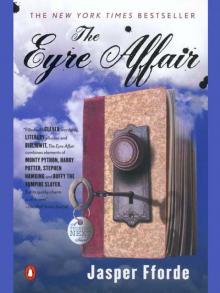 The Eyre Affair
The Eyre Affair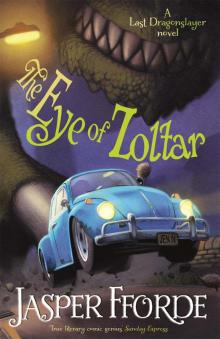 The Eye of Zoltar
The Eye of Zoltar The Woman Who Died a Lot
The Woman Who Died a Lot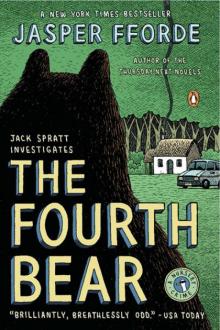 The Fourth Bear
The Fourth Bear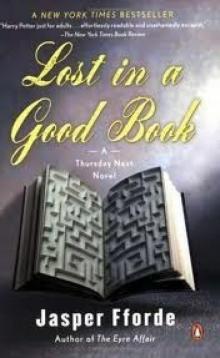 Lost in a Good Book
Lost in a Good Book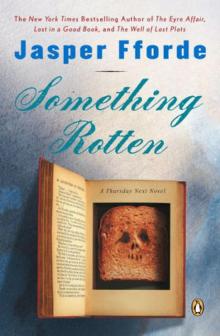 Something Rotten
Something Rotten The Well of Lost Plots
The Well of Lost Plots The Big Over Easy
The Big Over Easy The Constant Rabbit
The Constant Rabbit The Last Dragonslayer
The Last Dragonslayer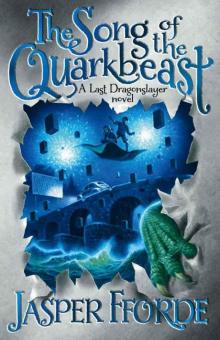 The Song of the Quarkbeast
The Song of the Quarkbeast One of Our Thursdays Is Missing
One of Our Thursdays Is Missing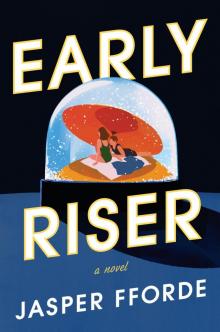 Early Riser
Early Riser Early Riser_The new standalone novel from the Number One bestselling author
Early Riser_The new standalone novel from the Number One bestselling author Something rotten n-4
Something rotten n-4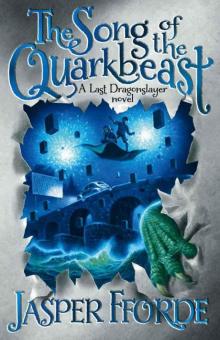 The Song of the Quarkbeast tld-2
The Song of the Quarkbeast tld-2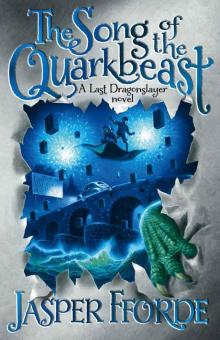 The Song of the Quarkbeast: Last Dragonslayer: Book Two
The Song of the Quarkbeast: Last Dragonslayer: Book Two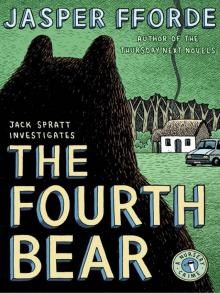 The Fourth Bear nc-2
The Fourth Bear nc-2 Lost in a Good Book tn-2
Lost in a Good Book tn-2 The Well of Lost Plots n-3
The Well of Lost Plots n-3 Thursday Next in First Among Sequels
Thursday Next in First Among Sequels First Among Sequels tn-5
First Among Sequels tn-5 The Eyre Affair tn-1
The Eyre Affair tn-1